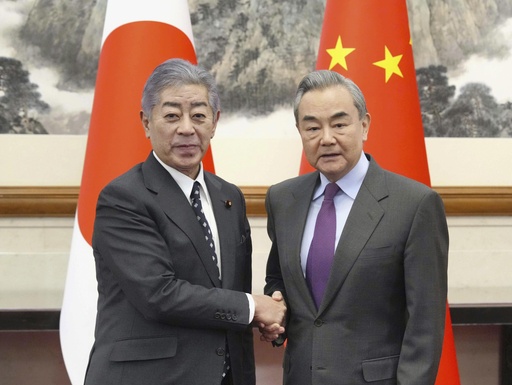BEIJING — China and Japan reached an agreement on Wednesday to initiate discussions aimed at addressing a variety of complex security issues that have strained their relationship in recent years. This arrangement comes in response to ongoing tensions, including territorial disputes and Japan’s decision to release water from a nuclear power plant that was damaged during a tsunami.
During his inaugural visit to China since taking office in October, Japanese Foreign Minister Takeshi Iwaya expressed optimism following his discussions with Chinese Premier Li Qiang and Foreign Minister Wang Yi. He described the meetings as “very candid” and focused on a diverse array of topics. “I feel we were able to build a personal relationship that would lead to the future,” Iwaya stated to reporters in Beijing.
Wang has committed to visiting Japan next year to engage in high-level economic dialogue, which will include topics related to environmental cooperation, energy conservation, and health care services. As a sign of goodwill, Japan announced it would ease visa restrictions for Chinese visitors, a move that follows China’s recent decision to permit entry for Japanese nationals without a visa.
Despite these gestures, significant differences remain. Iwaya brought up Japan’s worries regarding China’s military operations near a group of uninhabited islands that are claimed by both nations, as well as ongoing territorial disputes China has with other countries around the South China Sea.
Efforts to mend relations between the two nations are still in preliminary stages after a mutual commitment made by Chinese President Xi Jinping and Japanese Prime Minister Shigeru Ishiba during last month’s Asia-Pacific Economic Cooperation summit in Peru. “Currently, China-Japan relations are at a critical period of improvement and development,” Li reiterated at the start of his talks with Iwaya, expressing a willingness to collaborate closely with Japan.
Iwaya’s visit coincides with the impending inauguration of U.S. President-elect Donald Trump, whose presidency may introduce uncertainty into international relations. Trump has previously threatened to impose higher tariffs on Chinese products, reviving economic tensions from his first term. It remains to be seen how his administration will affect the U.S.-Japan alliance, which President Joe Biden has endeavored to reinforce in recent years to address the challenge posed by China’s rising influence.
In response to Chinese military actions in the past few years, Japan has altered its defense strategy, increasing military funding and moving away from a doctrine focused solely on self-defense. Earlier this year, Japan lodged a protest after a Chinese military aircraft entered its airspace, while a Chinese survey vessel navigated into Japanese territorial waters during the summer months.
Wang supported Iwaya’s proposition to establish a Japan-China security dialogue, aimed at enhancing communication regarding these pressing issues. Iwaya additionally urged for a swift reconsideration of a ban imposed by China on Japanese seafood imports, enacted after the Fukushima nuclear plant began releasing treated yet radioactive water. Both nations agreed to continue working on this matter and to resume discussions about exporting Japanese beef and rice to China.
Japan’s recent relaxation of its visa policies allows group tours from China to stay for increased durations of 30 days, up from the previous limit of 15, and extends the validity period of multiple-entry tourist visas from five to ten years.
Both countries share hopes that fostering people-to-people interactions will help to mend bilateral relations. In light of this, Iwaya urged China to enhance the safety of Japanese citizens in the country, especially following recent incidents involving attacks on Japanese schoolchildren, as well as bringing attention to the detention of several Japanese businesspersons on charges related to espionage. These issues have contributed to growing hesitancy among Japanese citizens regarding travel or employment in China.




